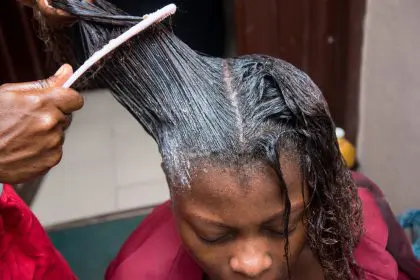You’ve been popping those pricey hair vitamins religiously for months. Your bathroom counter looks like a supplement store with bottles promising thicker, longer, more luxurious hair. You’ve invested in biotin, collagen, special multivitamins with proprietary “hair growth blends,” and maybe even some exotic-sounding herbs.
Yet when you look in the mirror, your hair seems exactly the same—not noticeably longer, not dramatically thicker, and certainly not transforming into the commercial-worthy mane those supplement companies keep promising. Your patience is wearing thin, but your hair isn’t growing any faster.
The hard truth? Those vitamins might be doing absolutely nothing for your hair growth. And the reasons why reveal a fascinating story about how our bodies actually work, what really influences hair growth, and why the supplement industry has been laughing all the way to the bank while you keep hoping for a miracle.
The vitamin myth nobody talks about
The supplement industry has masterfully convinced millions of people that the secret to gorgeous, fast-growing hair lies in expensive vitamins and minerals packaged in pretty bottles. This seductive story has created a multi-billion dollar industry built on promises of transformative results.
What these companies don’t tell you is that vitamin deficiencies are actually relatively rare in developed countries where food supply is abundant and diverse. Unless you’re seriously restricting your diet or have specific medical conditions, you’re likely getting most of the vitamins your hair needs from your regular meals.
When you consume vitamins your body doesn’t need, you’re not giving your hair “extra” growing power—you’re creating expensive urine. Most water-soluble vitamins simply pass through your system when taken in excess. Your body isn’t a bank where you can stockpile nutrients beyond what you need.
This explains why many people taking hair vitamins see zero results. If you weren’t deficient in those nutrients to begin with, adding more won’t suddenly supercharge your hair follicles. It’s like continuing to water a plant that already has the perfect amount of moisture—more doesn’t help and might actually cause harm.
The most frustrating part? Many popular hair supplement brands know this perfectly well. They’re counting on your desperation for longer hair to override critical thinking about whether these products actually address the real reasons your hair growth seems stalled.
The hidden saboteurs destroying your growth potential
While you’ve been focusing on vitamins, several powerful hair growth inhibitors might be working against you behind the scenes. These factors can completely neutralize any potential benefit from supplements, no matter how premium or potent they claim to be.
Chronic stress triggers a cascade of hormonal responses that push hair follicles into their resting phase prematurely. When your body perceives constant stress, it prioritizes essential functions over “luxury” operations like growing hair. The cortisol released during stress can directly inhibit the follicle activity that produces new hair growth.
This explains why many people experience sudden shedding or slowed growth during particularly stressful life periods. No amount of biotin can override your body’s stress response—addressing the stress itself is the only solution that actually works.
Hormonal imbalances represent another major growth blocker that vitamins alone cannot fix. Conditions like polycystic ovary syndrome, thyroid disorders, and even normal hormonal fluctuations can dramatically alter how your hair grows. The delicate balance of estrogen, testosterone, thyroid hormones, and cortisol plays a more significant role in your hair growth than any supplement ever could.
These hormonal issues require proper medical evaluation and treatment rather than self-medication with hair vitamins. When hormones are the culprit, addressing the underlying imbalance will do more for your hair than all the supplements in the world.
Perhaps most overlooked is the impact of poor circulation to your scalp. Your hair follicles need adequate blood flow to receive nutrients and oxygen for optimal growth. Without this crucial delivery system, even the perfect balance of vitamins won’t reach your follicles effectively. Circulation issues can stem from sedentary lifestyles, certain medical conditions, or even how you style your hair.
The real reason your hair growth has plateaued
Beyond vitamins and external factors, the natural biology of hair growth explains why you might not see the dramatic results you’re expecting. Understanding your hair’s natural growth patterns can save you from supplement disappointment.
Your hair has a genetically predetermined terminal length—the maximum length your individual hair strands can reach before falling out. This length varies dramatically between individuals and is largely determined by how long your hair stays in the growth phase before transitioning to the shedding phase.
Some people naturally have a longer growth phase, allowing their hair to grow to great lengths. Others have a shorter growth phase, meaning their hair will never reach extreme lengths regardless of what supplements they take. This explains why some people seem to grow waist-length hair effortlessly while others struggle to grow hair past their shoulders despite identical care routines.
This genetic reality is something no vitamin can change. While optimal nutrition supports your hair in reaching its maximum potential length, it cannot override your DNA to extend your growth phase beyond its natural duration.
Equally important is understanding that visible length retention often has more to do with preventing breakage than with actual growth rate. Your hair is likely growing at a fairly consistent rate of about half an inch per month from your scalp. If you’re not seeing length accumulation, the issue is probably that your hair is breaking off at the same rate it’s growing.
This breakage factor explains why focusing solely on ingesting vitamins misses half the equation. The health of your existing hair strands—their ability to resist breaking—determines whether length accumulates, regardless of how fast new hair emerges from your scalp.
The hair growth factors more powerful than any vitamin
While the right nutrients are certainly necessary for optimal hair growth, several factors have far more impact on your hair’s growth rate and health than vitamin supplements alone.
Protein intake stands as perhaps the most critical nutritional factor for hair growth. Your hair is made primarily of a protein called keratin, and without adequate dietary protein, your body simply lacks the building blocks to create new hair. Many people focusing on vitamins completely overlook their protein consumption, which matters far more for actual hair construction.
Consuming at least 0.8 grams of protein per kilogram of body weight daily provides the amino acid foundation your hair needs. For those actively trying to improve hair growth, slightly higher intake might be beneficial. Quality protein sources like eggs, lean meats, fish, legumes, and dairy provide the specific amino acids that form keratin.
Even more overlooked is the crucial role of consistent sleep in promoting hair growth. During deep sleep, your body releases growth hormone and regulates insulin levels, creating the optimal internal environment for cellular regeneration—including follicle activity. Sleep deprivation disrupts this delicate hormonal balance, potentially limiting how effectively your follicles can produce new hair.
Studies consistently show that poor sleep quality correlates with various hair growth issues. Improving your sleep hygiene often delivers more noticeable hair benefits than any supplement regimen, particularly for those regularly getting less than 7 hours of quality sleep.
Scalp health deserves far more attention than it typically receives in hair growth discussions. Your scalp is the soil in which your hair grows, and its condition directly impacts follicle function. Issues like inflammation, product buildup, excess oil, or dryness can physically obstruct or slow hair growth at the source.
Regular gentle exfoliation, proper cleansing, and scalp-focused treatments can create a healthier environment for new growth than ingesting supplements. Many people experiencing slow growth have scalp issues they’ve never addressed, focusing instead on internal solutions while ignoring the actual soil their hair grows from.
The smart approach to hair growth supplementation
Despite the limitations of supplements for hair growth, strategic nutritional support can make a difference in specific circumstances. The key is targeting your approach rather than blindly following supplement trends.
Before spending money on supplements, get appropriate blood testing to identify actual deficiencies. Iron deficiency, in particular, can significantly impact hair growth, especially in menstruating women. Low ferritin levels—the stored form of iron—may limit hair growth even when standard iron tests appear normal.
Similarly, vitamin D deficiency has been linked to various hair growth issues and is common even in sunny climates due to indoor lifestyles and sunscreen use. Testing provides objective data on whether supplementation might genuinely benefit your hair rather than guessing based on marketing claims.
If testing reveals no deficiencies, consider focusing your budget on high-quality protein sources and omega-3 fatty acids rather than specialized hair vitamins. These nutritional components provide the structural elements and anti-inflammatory benefits that directly support hair growth better than random vitamin cocktails.
For those experiencing sudden increased shedding or slowed growth, tracking potential triggers often proves more valuable than supplementation. Hormonal changes, medication side effects, significant weight loss, illness, or major life stressors frequently explain sudden hair changes that vitamins cannot address.
When to seek professional help for hair growth concerns
While some hair growth plateaus are normal and respond to lifestyle adjustments, certain situations warrant professional evaluation rather than continued self-supplementation.
If you experience sudden, dramatic hair shedding, especially if accompanied by other symptoms like fatigue, weight changes, or skin issues, consult a healthcare provider. This pattern often indicates underlying health conditions that require proper diagnosis and treatment.
Patches of hair loss or significant thinning in specific areas suggest conditions like alopecia areata or scarring alopecias that need medical intervention. These conditions won’t respond to nutritional supplements and require specialized treatments.
When hair growth has remained stagnant despite addressing lifestyle factors and ensuring proper nutrition for several months, a dermatologist specializing in hair disorders can provide advanced diagnostics and treatment options beyond what vitamins can offer.
The journey to longer, healthier hair often has less to do with what supplements you’re taking and more to do with understanding your hair’s unique biology, addressing lifestyle factors, and ensuring your overall health supports optimal growth. Sometimes the most effective solution isn’t found in another supplement bottle but in addressing the fundamental factors that allow your hair to reach its natural potential.
















